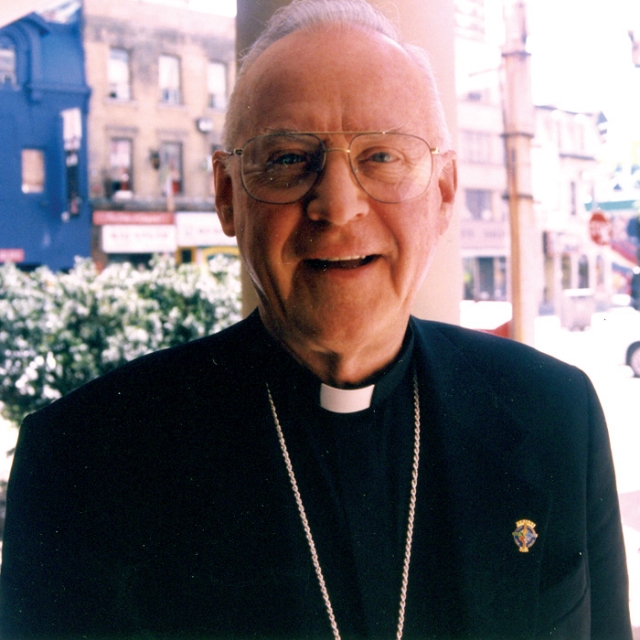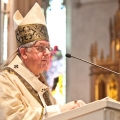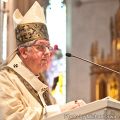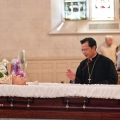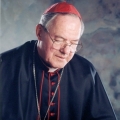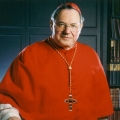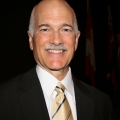The last time Bishop John Sherlock saw his old friend Cardinal Aloysius Ambrozic there were tears in Sherlock’s eyes.
“The devastation of that Parkinson’s (like disease) had set in,” recalled London’s bishop emeritus. “I remember being overwhelmed with sadness. I remember I came out of his room and I broke into tears.”
Cardinal Ambrozic was a scholar who spoke English, French, Italian and German, read Hebrew, Aramaic and Greek, all in addition to his native Slovenian. It was painful for Sherlock to think of the cardinal imprisoned by a disease, unable to communicate.
“His life must have been pretty miserable. He was a voracious reader and I presume even that was stripped away. He was a great communicator and that was taken away,” said Sherlock.
Sherlock prayed for Cardinal Ambrozic by name every day over the last two years. He directed his prayers to Blessed John Paul II, who had also suffered through Parkinson’s.
Tories honoured for promoting religious freedom
By Vanessa Santilli-Raimondo, The Catholic RegisterMISSISSAUGA, ONT. - International Christian Voice is hosting a dinner Sept. 9 in Mississauga to thank Prime Minister Stephen Harper and his Conservative government for their work in promoting religious freedom internationally.
The Toronto-based human rights organization is run by Peter Bhatti, the brother of Shahbaz Bhatti, the Pakistani minorities minister and Christian who was assassinated last March after speaking out against the country’s blasphemy laws.
“The Conservative government has made an announcement of an international religious freedom office (the Office of Religious Freedom) and they’re trying to promote religion internationally, so we want to thank them,” said Bhatti.
“When my brother was murdered, (Immigration Minister) Jason Kenney attended his funeral… and gave him tribute. And before, nobody was even talking about religious freedom. But now, Stephen Harper has made an announcement that they would open a new office with the focus internationally on religious freedom and that makes us very hopeful.”
Farewell to Cardinal Ambrozic, a ‘disciple, pastor and apostle’
By Catholic Register StaffTORONTO - Cardinal Aloyisus Ambrozic was a faithful disciple whose love of Jesus and dedication to the Lord marked a life of selfless dedication, Toronto Archbishop Thomas Collins told a packed funeral Mass.
An overflow crowd of bishops, priests, family, dignitaries and friends filled St. Michael’s Cathedral on Aug. 31 for the Mass of Christian Burial for Toronto’s ninth archbishop. Approximately 200 people, unable to get into the cathedral, stood outside and followed the Mass on loudspeakers.
Cardinal Ambrozic, 81, died Aug. 26 at Providence Healthcare following a lengthy battle with Progressive Supranuclear Palsy.
Among the attendees were Cardinal Jean-Claude Turcotte, archbishop of Montreal, and Msgr. Luca Lorusso, representing the Vatican in Canada, as well as hundreds of priests from the archdiocese of Toronto and more than 20 bishops.
Politicians in attendance included federal Finance Minister James Flaherty, Ontario Lt.-Gov. David Onley, Toronto Mayor Rob Ford, Mississauga Mayor Hazel McCallion and Ontario Environment Minister John Wilkinson.
Cathedral overflowing with those paying tribute to late cardinal
By Sheila Dabu Nonato, The Catholic Register TORONTO - More than 1,000 people gathered to pay tribute to the life and service of Toronto’s late Cardinal Aloysius Ambrozic at his Aug. 31 funeral Mass at St. Michael’s Cathedral.
TORONTO - More than 1,000 people gathered to pay tribute to the life and service of Toronto’s late Cardinal Aloysius Ambrozic at his Aug. 31 funeral Mass at St. Michael’s Cathedral.
Parishioners like Margaret Rose came to offer prayers for the late cardinal. Rose, 73, was first in a long line of about 200 people hoping for public seating. She arrived close to three hours before the funeral was set to begin.
“I came out of respect. He was our (cardinal) for 16 years,” she said while holding a rosary and recalling how the cardinal loved to shake people’s hands after Sunday Mass. “I’ll spend five hours here if I have to.”
Due to renovations at the Cathedral, seating was limited to about 800 people. About half the people in line got a seat, with about 200 more praying outside the church.
Several dignitaries attended the funeral, including federal Finance Minister Jim Flaherty.
Archbishop Collins homily at the funeral of Cardinal Ambrozic
By Catholic Register StaffAs we gather to mourn Cardinal Ambrozic, and to celebrate this Funeral Mass for the repose of his soul, our consciousness of the Providence of God, and our faith in the Risen Lord, brings us consolation and hope in this time of sorrow.
Death reminds us all of the fragility of earthly life, and of our need to place our hope in the Lord alone, he who guides us on our pilgrimage through this vale of tears to the house of the heavenly Father. When we come together in the solemn rites of mourning of the Church, of our family of faith, we are ourselves strengthened through the Word of God, and through the Eucharist, and through our renewed awareness that when the time comes for each of us to die, we too will come before the Lord supported by the prayers of our brothers and sisters in Christ.
Cardinal Ambrozic died the day before the feast of St Monica, the mother of St Augustine, patron of the seminary which was such an important part of his life. In his Confessions, Augustine writes of the death of his mother, and tells us that as Monica was dying, she made only one request of her son: “One thing only do I ask of you, that you remember me at the altar of the Lord, wherever you may be.”
Cardinal's lying in state at St. Michael's Cathedral
By Michael Swan, The Catholic RegisterTORONTO - They sang "Christ is the World's Light" as they wheeled Cardinal Aloysius Ambrozic's coffin down the centre aisle of St. Michael's Cathedral at 1:30 Tuesday afternoon to begin two days of vigil and visitation.
The cardinal's simple casket, adorned only with a crucifix, was greeted at the cathedral doors by St. Michael's Cathedral rector Fr. Michael Busch, who sprinkled it with holy water — a reminder of our common baptism.
The ceremony began with more than 200 already in the cathedral awaiting the cardinal's last entry into his Church. As the ceremony progressed they kept coming. By the time the congregation was singing Salve Regina the cathedral was more than half full.
Family, friends, trusted advisors and priests were among the first to file by the casket and offer a prayer for their old ally.
Friends recall Cardinal Ambrozic's dedication to Jesus
By Michael Swan, The Catholic RegisterTORONTO - Cardinal Aloysius Ambrozic spent 56 years as a priest because Jesus was the man he admired most. When he entered the seminary just after the Second World War the new seminarians were asked about their heroes. A few snickered when the immigrant boy from eastern Europe stood and named Jesus as his hero, but decades later as cardinal and archbishop he would stand at the pulpit and proclaim Jesus.
"It is Jesus to whom we look. It is Jesus whom we imitate. It is Jesus whom we follow. It is Jesus who is with us so we can be with Him," were words that often found their way into the late Cardinal Ambrozic's sermons.
"Any time he had a choice, his choice would be to talk about Jesus," said Kitty McGilly, former faith formation consultant with the Toronto Catholic District School Board. "He didn't say Christ, he didn't say God, he didn't say Lord. He very intimately named Jesus."
A friend of the cardinal's for more than 30 years, McGilly remembers him standing off-stage at the SkyDome in 1984 waiting to speak to 45,000 people who had turned up for an event called "Journey of Faith."
Knights of Columbus step up for Goderich tornado relief
By Vanessa Santilli-Raimondo, The Catholic RegisterTORONTO - The Knights of Columbus in the tornado-ravaged town of Goderich, Ont., are front and centre in the efforts to help the town recover from a devastating tornado that hit Aug. 21.
"(Our hall is) the evacuation centre," Steve Winter, Grand Knight of the Father Nagle Council 5420, told The Catholic Register. "We have a hall that will hold 600 people for banquets."
When the tornado tore through the town, "we were the spot in town that had electricity because we're hooked up to the town's generator," said Winter.
Because the Knights of Columbus hall is the central location for those in need, the Canadian Red Cross, the Salvation Army, Victims Services and the Society for the Prevention of Cruelty to Animals are set up in the hall, too.
Cardinal Aloysius Ambrozic — 1930-2011
By Catholic Register StaffTORONTO - As archbishop of Toronto for 16 years, Cardinal Aloysius Ambrozic oversaw the transformation of Canada's largest diocese into a multicultural, multi-racial home to 1.6 million Catholics. But while acknowledging the challenges implicit in change, Cardinal Ambrozic once said his main challenge was simply to be true to the Catholic Church.
That is how the cardinal is being remembered today, as a man unwavering in his beliefs and unfailingly true to the Church he served with faith, grace and distinction through 56 years of priesthood.
After a lengthy illness Cardinal Ambrozic died peacefully at Providence Healthcare Toronto on Aug. 26 shortly after receiving the sacramental anointing from Archbishop Thomas Collins, the cardinal's successor as archbishop. The cardinal was 81.
The body of Cardinal Ambrozic will arrive at St. Michael's Cathedral on Tuesday, August 30 at 1:30 p.m. At that time the Rite of Reception will be held.
His Eminence will lie in state for visitation at the cathedral Tuesday afternoon from 2-4 p.m. and 7-9 p.m. with the Office for the Dead being celebrated at 8:30p.m. All Tuesday events are open to the public.
The funeral Mass for Cardinal Ambrozic be held on Wednesday, August 31 at 10:30 a.m. at St. Michael's Cathedral. Due to renovations currently underway at the cathedral and expected articipation by up to 500 priests, family, friends, etc. There will be extremely limited public seating available.
In lieu of flowers, those who wish to pay tribute to the Cardinal are invited to donate to one of His Eminence's favourite charities, the Shepherds' Trust.
"Cardinal Ambrozic's tremendous contributions to the spiritual life of the faithful of our archdiocese and the heritage of his wisdom, his knowledge and his love of the priesthood will remain with us all," Collins said in a statement.
Collins praised Cardinal Ambrozic as a dedicated priest and brilliant scriptural scholar. He called him "a man who loved to learn, to teach and to spread the Gospel message in so many ways."
"Cardinal Ambrozic was a spiritual shepherd who cared deeply for all who were entrusted to his pastoral care, and we commend him in our prayers to our heavenly Father," Collins said.
Cardinal Ambrozic served as archbishop of Toronto from March 1990 until his retirement was accepted by Pope Benedict XVI and he stepped down in December 2006. He was named in 1976 by Pope Paul VI as auxiliary bishop to Archbishop Philip Pocock. His initial role included overseeing the expanding ethnic communities in the archdiocese. He was also a fervent advocate of Catholic education and had a particular interest in St. Augustine's Seminary, where he taught Scripture for several years and served as Dean of Studies from 1971 until his appointment as bishop.
On May 22, 1986, he was appointed coadjutor archbishop, meaning he had been selected to succeed Cardinal Gerald Emmett Carter on his retirement. On March 17, 1990, he was made archbishop. In 2002, Pope John Paul paid the cardinal a visit in Toronto, along with hundreds of thousands of young people who attended the World Youth Day in July of that year.  During Cardinal Ambrozic’s time, the face of the Church in Toronto changed dramatically. Fuelled by a flood of immigrants from countries around the world, it grew from a Catholic population of 1.1 million in 1986, when he was coadjutor archbishop, to more than 1.8 million today. To respond to the rising demand for spiritual nourishment and religious services, he oversaw the construction of 25 new churches, most in the rapidly expanding suburbs around the city.
During Cardinal Ambrozic’s time, the face of the Church in Toronto changed dramatically. Fuelled by a flood of immigrants from countries around the world, it grew from a Catholic population of 1.1 million in 1986, when he was coadjutor archbishop, to more than 1.8 million today. To respond to the rising demand for spiritual nourishment and religious services, he oversaw the construction of 25 new churches, most in the rapidly expanding suburbs around the city.
During his time as bishop and archbishop, lay movements and groups, many ethnically based, flourished and some of the ethnic (often called national) parishes became some of the most lively parishes in the diocese.
Cardinal Ambrozic was a private person who had a reserved personality that the secular media sometimes interpreted as aloofness. He was a fierce defender of the faith and was unafraid to combat cultural trends that threatened the underpinnings of family and Church. His views were often fiercely criticized in the media, which painted him as unwilling to yield to change. But in his position as one of Canada’s leading authority figures in the Church, he was unyielding in professing the truth of the Church and was undaunted by his critics.
He once attributed his durability to “simple natural stubbornness,” a clear sense of his own identity, daily prayer and “wonderful friendships with priests."
The priestly life that placed Cardinal Ambrozic at the top of Canada’s largest Catholic diocese began in a small, rural Eastern European settlement at a time when the Great Depression was ravaging most of the world.
He was born on Jan. 27, 1930 to Aloysius, Sr. and his wife, Helen, near Gaberje, Slovenia. The elder Ambrozic was a small farmer and grocer, an independent and outspoken man who took his religion as seriously as everyone did in those days in what was then Yugoslavia.
More than piety, however, Cardinal Ambrozic was shaped by his father’s sense of leadership, one that stemmed from the man’s abiding faith. He was the second of seven children, the eldest of five boys. As such, he felt an obligation to help the family survive in the leaner times in Slovenia that followed the Second World War.
The war brought strife, violence and destruction. It was a time of terror that made its mark on the future cardinal. His father, being an opinionated Christian Democrat, was hated by both the Communists and the fascist collaborators of Nazi Germany. Once the Nazis were defeated, the Communists won the peace in Yugoslavia, violently and systematically cleansing the country of all those who didn’t fit their plans.
In May 1945, the entire Ambrozic family fled to Austria. For the next three years, life was a series of displaced persons camps in Vetrinj, Peggez and Spittal an der Drau. Somehow the young man completed his high school education.
Canada beckoned, however, thanks to an uncle who was a Franciscan priest, a friendly bishop in Toronto and some Carmelite nuns. The sisters were asked to sponsor the Ambrozic family and readily accepted. On arrival in Canada, the elder Ambrozic got a caretaker job with a summer camp and the family moved to the spot near Markham, Ont.
Young Ambrozic, as the oldest son, fully expected his help would be needed to support the family. But it wasn’t necessary, so he began to consider his future. At the back of his mind was the priesthood.
“Certainly it wasn’t any kind of divine revelation. You go to the seminary because you want to try it out,” he once said. Though he originally saw himself as a scholarly priest, parish life began to grow on him. But he was called back to Toronto to teach Latin at St. Augustine’s. The official language of the Church is only one of four ancient languages he could speak.
Though he originally saw himself as a scholarly priest, parish life began to grow on him. But he was called back to Toronto to teach Latin at St. Augustine’s. The official language of the Church is only one of four ancient languages he could speak.
Then studies called. He was off to Rome for postgraduate work at the Angelicum, where he received a licentiate in theology, and the Pontifical Biblical Institute, where he obtained a licentiate in sacred Scripture.
While in Rome, he lived at the College Capranica, whose origins go back to the 15th century, the first residence for diocesan priests studying at Rome’s various universities.
Life in the birthplace of Europe in the 1950s was wonderful. When he wasn’t studying, there was a cozy coffee shop around the corner that “served the best coffee in Rome.” Then all around him was inspiration in the form of ancient churches and the ruins of the Roman Empire.
When his studies ended, Fr. Ambrozic returned to Toronto to teach Scripture at St. Augustine’s from 1960 to 1967. He would later teach New Testament from 1970 to 1976 at the Toronto School of Theology, which combines the religion faculties of numerous institutions, including St. Augustine’s. Besides teaching, he found time for academic writing, publishing The Hidden Kingdom: A Redaction-Critical Study of the References to the Kingdom of God in Mark’s Gospel (Washington, D.C., 1972) and Remarks on the Canadian Catechism (Toronto, 1974), along with other academic articles. In May 1976, Pope Paul VI called and Fr. Ambrozic became Bishop Ambrozic, auxiliary to Archbishop Pocock. Though it was an unexpected honour, he took to his new job dutifully and energetically. In 1984-85, he made pastoral visits to all 43 Catholic high schools in the archdiocese to strengthen and support religious education. He was also a member of the Christian Education Commission of the Canadian Conference of Catholic Bishops and helped revise the Canadian catechism.
In May 1976, Pope Paul VI called and Fr. Ambrozic became Bishop Ambrozic, auxiliary to Archbishop Pocock. Though it was an unexpected honour, he took to his new job dutifully and energetically. In 1984-85, he made pastoral visits to all 43 Catholic high schools in the archdiocese to strengthen and support religious education. He was also a member of the Christian Education Commission of the Canadian Conference of Catholic Bishops and helped revise the Canadian catechism.
Shortly after he was made archbishop of Toronto on March 17, 1990, he was one of four bishops chosen to represent Canada at the 1990 Synod on the Formation of Priests in Rome. More appointments quickly followed, including in 2005 when he was appointed to an advisory body on the financial matters of the Holy See.
Cardinal Ambrozic once said that, throughout his career, he never doubted that he answered the right call. “I went into it with a very clear idea of what I was into,” he once said. “I never felt I made a mistake.”
The Cardinal’s legacy is commemorated in several places throughout the GTA, including Cardinal Ambrozic Catholic Secondary School in Brampton as well as the Cardinal Ambrozic Houses of Providence, the long-term care facility in Scarborough, where the cardinal spent his final months.
{iarelatednews articleid="3397,299,3882,3810,292,170"}
Jack Layton's spiritual side revealed during battle with cancer
By Deborah Gyapong, Canadian Catholic NewsOTTAWA - Jack Layton was not religious but the former NDP leader is being remembered as a deeply spiritual man whose commitment to a caring society had a Christian foundation.
Changes coming in various dioceses
By Catholic Register StaffOTTAWA - Due to recent episcopal nominations as well as the death of Timmins Bishop Paul Marchand, a number of dioceses will see some changes in the near future.
Fr. Patrick Lafleur has been elected administrator of the diocese of Timmins after the death of Marchand, S.S.M., On July 24.

